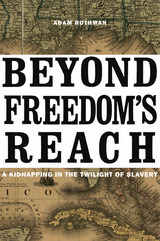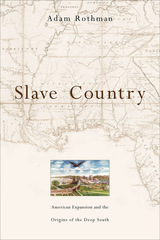
Born into slavery in rural Louisiana, Rose Herera was bought and sold several times before being purchased by the De Hart family of New Orleans. Still a slave, she married and had children, who also became the property of the De Harts. But after Union forces captured New Orleans in 1862 during the American Civil War, Herera’s owners fled to Havana, taking three of her small children with them. Beyond Freedom’s Reach is the true story of one woman’s quest to rescue her children from bondage.
In a gripping, meticulously researched account, Adam Rothman lays bare the mayhem of emancipation during and after the Civil War. Just how far the rights of freed slaves extended was unclear to black and white people alike, and so when Mary De Hart returned to New Orleans in 1865 to visit friends, she was surprised to find herself taken into custody as a kidnapper. The case of Rose Herera’s abducted children made its way through New Orleans’ courts, igniting a custody battle that revealed the prospects and limits of justice during Reconstruction.
Rose Herera’s perseverance brought her children’s plight to the attention of members of the U.S. Senate and State Department, who turned a domestic conflict into an international scandal. Beyond Freedom’s Reach is an unforgettable human drama and a poignant reflection on the tangled politics of slavery and the hazards faced by so many Americans on the hard road to freedom.


A microcosm of the history of American slavery in a collection of the most important primary and secondary readings on slavery at Georgetown University and among the Maryland Jesuits
Georgetown University’s early history, closely tied to that of the Society of Jesus in Maryland, is a microcosm of the history of American slavery: the entrenchment of chattel slavery in the tobacco economy of the Chesapeake in the seventeenth and eighteenth centuries; the contradictions of liberty and slavery at the founding of the United States; the rise of the domestic slave trade to the cotton and sugar kingdoms of the Deep South in the nineteenth century; the political conflict over slavery and its overthrow amid civil war; and slavery’s persistent legacies of racism and inequality. It is also emblematic of the complex entanglement of American higher education and religious institutions with slavery.
Important primary sources drawn from the university's and the Maryland Jesuits' archives document Georgetown’s tangled history with slavery, down to the sizes of shoes distributed to enslaved people on the Jesuit plantations that subsidized the school. The volume also includes scholarship on Jesuit slaveholding in Maryland and at Georgetown, news coverage of the university’s relationship with slavery, and reflections from descendants of the people owned and sold by the Maryland Jesuits.
These essays, articles, and documents introduce readers to the history of Georgetown's involvement in slavery and recent efforts to confront this troubling past. Current efforts at recovery, repair, and reconciliation are part of a broader contemporary moment of reckoning with American history and its legacies. This reader traces Georgetown’s “Slavery, Memory, and Reconciliation Initiative” and the role of universities, which are uniquely situated to conduct that reckoning in a constructive way through research, teaching, and modeling thoughtful, informed discussion.

Slave Country tells the tragic story of the expansion of slavery in the new United States. In the wake of the American Revolution, slavery gradually disappeared from the northern states and the importation of captive Africans was prohibited. Yet, at the same time, the country's slave population grew, new plantation crops appeared, and several new slave states joined the Union. Adam Rothman explores how slavery flourished in a new nation dedicated to the principle of equality among free men, and reveals the enormous consequences of U.S. expansion into the region that became the Deep South.
Rothman maps the combination of transatlantic capitalism and American nationalism that provoked a massive forced migration of slaves into Louisiana, Alabama, and Mississippi. He tells the fascinating story of collaboration and conflict among the diverse European, African, and indigenous peoples who inhabited the Deep South during the Jeffersonian era, and who turned the region into the most dynamic slave system of the Atlantic world. Paying close attention to dramatic episodes of resistance, rebellion, and war, Rothman exposes the terrible violence that haunted the Jeffersonian vision of republican expansion across the American continent.
Slave Country combines political, economic, military, and social history in an elegant narrative that illuminates the perilous relation between freedom and slavery in the early United States. This book is essential reading for anyone interested in an honest look at America's troubled past.
READERS
Browse our collection.
PUBLISHERS
See BiblioVault's publisher services.
STUDENT SERVICES
Files for college accessibility offices.
UChicago Accessibility Resources
home | accessibility | search | about | contact us
BiblioVault ® 2001 - 2024
The University of Chicago Press









